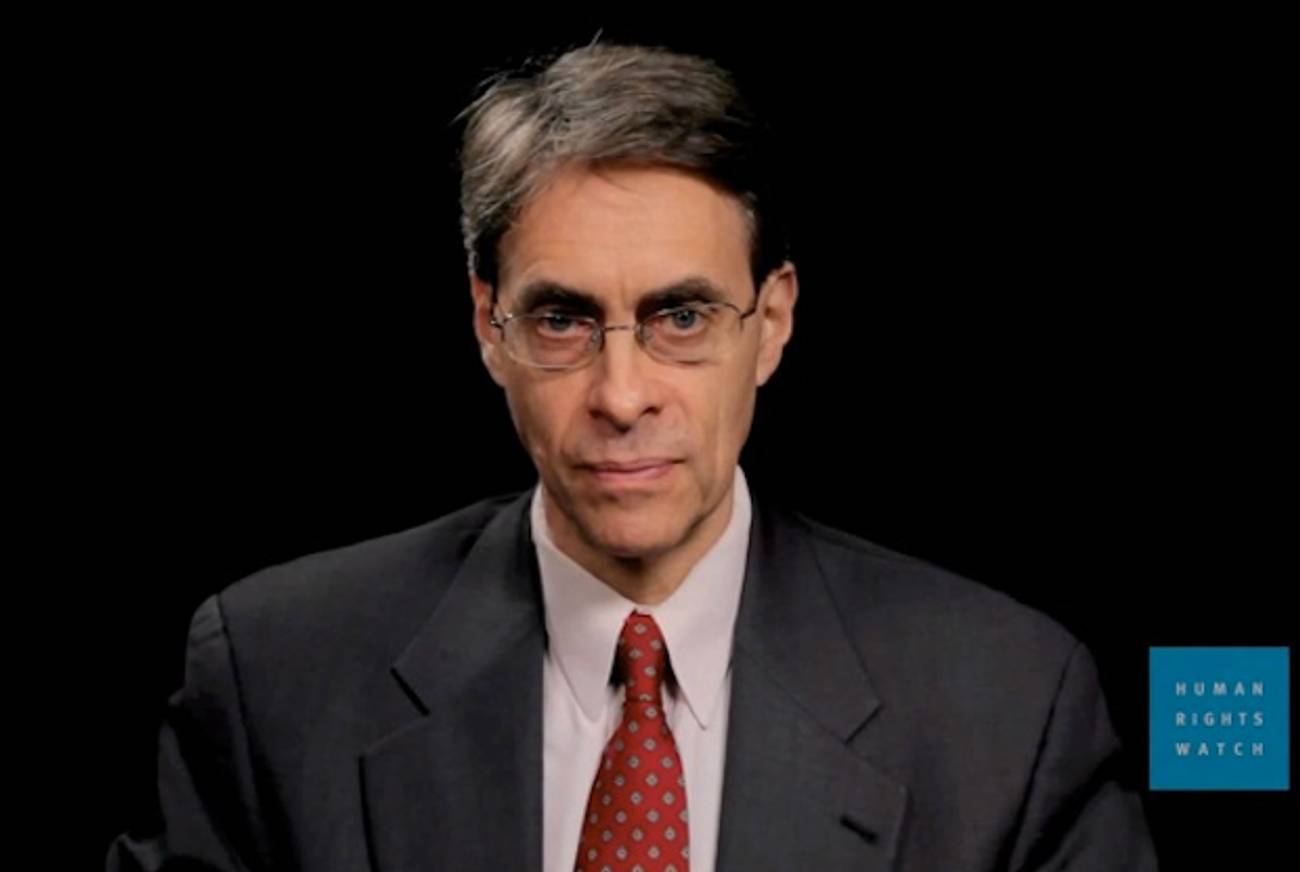The Human Rights Watch Internal Battle on Iran
Leaked email shows Kenneth Roth comparing mullahs to Shas




Writing in the Wall Street Journal yesterday, David Feith deftly outlined a debate taking place within the ranks of influential nonprofit group Human Rights Watch (which historically has done some pretty important work).
On one side is Executive Director Kenneth Roth, who believes that the series of odious rhetorical provocations made by Iran’s religious and political leaders about annihilating Israel does not constitute incitement to genocide. On the other side is Roth’s internal critics at Human Rights Watch, who disagree.
Here’s some of what Feith wrote:
Asked in 2010 about Iranian President Mahmoud Ahmadinejad’s statement that Israel “must be wiped off the map,” Mr. Roth suggested that the Iranian president has been misunderstood. “There was a real question as to whether he actually said that,” Mr. Roth told The New Republic, because the Persian language lacks an idiom for wiping off the map. Then again, Mr. Ahmadinejad’s own English-language website translated his words that way, and the main alternative translation—”eliminated from the pages of history”—is no more benign. Nor is Mr. Ahmadinejad an outlier in the regime. Iran’s top military officer declared earlier this year that “the Iranian nation is standing for its cause that is the full annihilation of Israel.”
Mr. Roth’s main claim is legalistic: Iran’s rhetoric doesn’t qualify as “incitement”—which is illegal under the United Nations Genocide Convention of 1948—but amounts merely to “advocacy,” which is legal.
Feith points to internal emails in which Roth essentially argues that because Iran has not yet actually set on its course to annihilate Israel, the words of Ahmadinejad and the various leaders in Iran (along with those missile-adorned street parades) are merely suggestions. Evidence about the country’s nuclear program as well as its indisputable bankrolling of groups like Hezbollah and Hamas aren’t clear proof enough either.
In another email leaked to Tablet, Roth washes his hands by comparing the words and deeds of Iran’s leaders and its military satellites to that of Rabbi Ovadia Yosef, the spiritual leader of the Israeli political party Shas. In the email, Roth wrote of Yosef:
Speaking initially of “Iranian rulers” but then simply of “Iran” (notably, not even the state of Iran) as well as Hezbollah, he said, “May God cut them down and destroy them off the face of the earth.” This is similar to his statement two years ago directed toward the Palestinians: “Abu Mazen [Abbas] and all those evil men – may they perish from this world. May God Almighty strike them and these Palestinians.”
Would you suggest that Human Rights Watch denounce these statements as incitement to genocide? If not, what is the difference between these statements and the ones by Iranian leaders that you consider incitement to genocide. After all, Rabbi Ovadia Yosef’s statements are arguably more direct than those made by Iranian leaders, and Israel, unlike Iran, has the means to carry them out.
I won’t defend Yosef’s disgusting remarks. Neither will a panoply of Jewish and Israeli organizations that condemned them, nor the Israeli government, which immediately said that Yosef’s words “do not reflect the approach of Prime Minister Benjamin Netanyahu, nor the position of the government of Israel.” That’s the first distinction here.
The second and more obvious distinction, which makes Roth’s comparison between Yosef and Iran’s leadership all the more troubling, is that Yosef is a fringe, fanatical figure in Israel. While he remains influential in some circles, he is neither a head of state nor an official who sets government policy. And despite his inflammatory prayers, Yosef also opposes a military strike on Iran.
The same can’t be said for Iran and its leaders, whose incitements go unchallenged in Iran and, apparently, in the top offices of Human Rights Watch.
Related: Broken Watch
Dancing Around Genocide [WSJ]
PM Pulls Back from Yosef’s Words [Jerusalem Post]
Adam Chandler was previously a staff writer at Tablet. His work has appeared in the New York Times, the Wall Street Journal, the Atlantic, Slate, Esquire, New York, and elsewhere. He tweets @allmychandler.